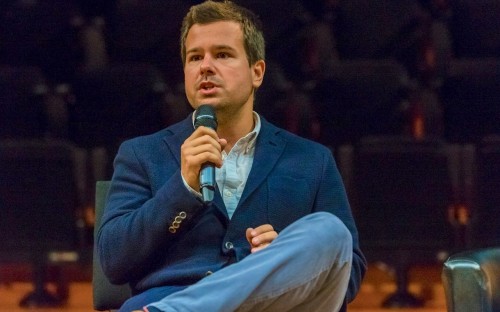The business grew and Manuel found himself producing pedals in a factory on the outskirts of Lisbon, dealing with large amounts of money like he’d never seen before.
He started to struggle—he knew he lacked the business knowledge needed to drive the business forward.
So, in 2015, he decided to pursue The Lisbon MBA International, a partnership between Portugal’s top two business schools – Católica-Lisbon and Nova SBE – and US b-school behemoth MIT Sloan. The Lisbon MBA is ranked among the 20 best full-time MBAs in Europe by the Financial Times.
“As soon as my idea turned into a business, I started to deal with a lot of stuff I didn’t have the knowledge for,” Manuel explains. “I had a lot of problems with quality control, cash flow, finances, and paying taxes—I felt I needed some core management skills.
“My father did an MBA at Harvard, my brother-in-law studied at INSEAD. I was comparing the programs and, in terms of the core syllabus, The Lisbon MBA was very similar,” he continues.
“Lisbon is also booming in terms of entrepreneurship. I knew that I wanted to be connected to the entrepreneurship ecosystem here.”
There’s no doubt that entrepreneurship in Lisbon is on the up. In 2015, the EU’s Committee of Regions named Lisbon its ‘European Entrepreneurial Region of the Year’.
According to investment research firm Preqin, Venture Capital (VC) investment in Lisbon-based startups grew six-fold—to $18.5 million—between 2015 and 2016. Last year’s Web Summit—Europe’s largest technology conference—attracted over 53,000 attendees. Lisbon will host the Web Summit again in November this year.
Every summer, students on The Lisbon MBA choose between an MBA internship, a two-month international exchange, or the Entrepreneurship Hub, which takes participants through the whole process of developing a new business, from idea conception to launch. MBA students enjoy access to Startup Lisboa; Portugal’s number one startup incubator which has supported over 200 startups since its launch in 2012.
Manuel decided to take his new business idea—selling fresh, ready-made sushi rice in supermarkets—through The Lisbon MBA’s Entrepreneurship Hub. As he started to validate his business model, his first meeting was with Joao Vasconcelos; then president of Startup Lisboa, who went on to become Portugal’s secretary of state for industry.
Compared to his early startup experience, Manuel felt The Lisbon MBA’s supportive community made a difference.
“If you do an MBA, you learn everything more quickly,” he says. “When I did it alone, everything was common sense. I would search for things online, and talk to people I knew who were not necessarily from an entrepreneurship background.
“But through the Entrepreneurship Hub, I met a lot of people starting their own businesses. I was in a startup ecosystem, sharing ideas and iterating along the way. Here in Lisbon, there’s a lot of cooperation; everyone is very eager to share their success.”
Lisbon’s tech-focused startup scene has given birth to success stories like global student accommodation firm Uniplaces, Google Translate alternative Unbabel, and Codacy, a platform which automatically reviews software developers’ code.
Manuel co-founded his own tech startup Viable Report—a platform connecting startups with investors—with his classmate, Jaime Bardon, during The Lisbon MBA International. He helped create the Lisbon Entrepreneurship Club, to support the growth of entrepreneurship in Lisbon.
Manuel’s now project manager at a digital transformation company, working with Lisbon-based startups and SMEs on a daily basis. But he won’t rule out a return to entrepreneurship in the future.
“In Lisbon, we have the resources, the developers, and the computer engineers to start a tech company. The level of training and education high, and salaries are still very low. It’s still a place where you can set up a company for a quarter or third of the price of what it costs in Berlin or London,” he continues.
“We have an air bridge to the states, we connect to the whole of Europe and, because of the quality of life here, it’s the perfect place to start something.”
RECAPTHA :
0a
40
39
46








